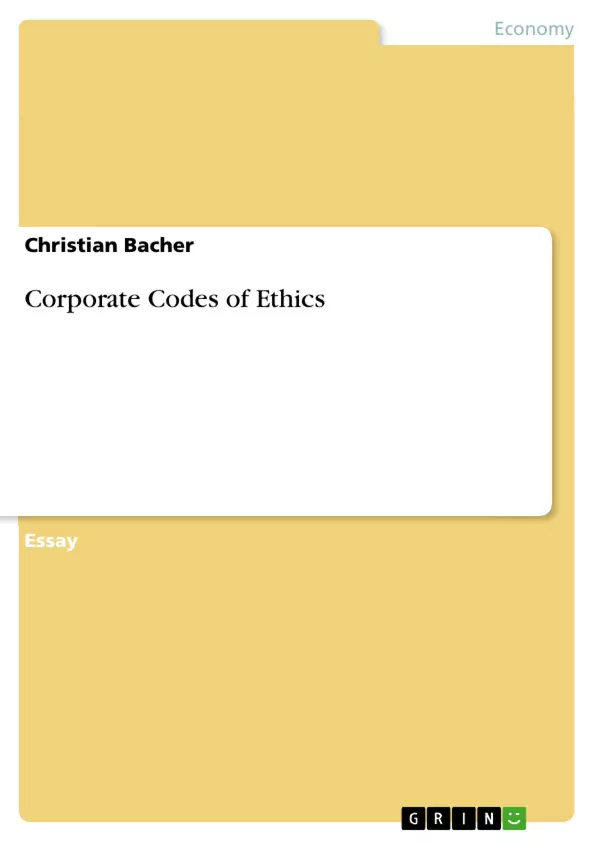As long as human societies exist, the life of man has been based on norms, rules, values and practices that governed human behaviour. Individual and communal-shared ethics even make life within society possible as we know it. Part of this social life is doing business, in form of exchanging goods to fulfil basic needs and to achieve higher levels of satisfaction for oneself and for others. However, to combine moral thinking and acting with today's business activities in a free market economy seems to be counterintuitive. Somehow both notions do not really fit together. Still, Corporate Codes of Ethics exist.
This essay consist of two parts. Each part reflects one question or problem that I found worthy of having more light shed on it. The first part answers the question "Why do corporate Codes of Ethics exist?" or "Why do corporations establish corporate Codes of Ethics?" under the basic assumptions, that ethics are 'costly' and therefore against the idea of maximising profit which is predominant in the market ideology. Proving these assumptions is not so easy.
First the term ethics will be defined and selected theories which could be the basis for Codes of Ethics will be portrayed. Then it is important to know what kind of morality is underlying the modern market ideology as we know it. Following that a correlation is sought between the market morality and corporate ethics, ending in the insight that corporate morality is costly and, therefore, is against economic intuition. Part one finishes then with a surprisingly simple answer to the question why codes exist.
The second part brings the findings of the first part in a broader context. The considered corporation of part one now 'grows' beyond borders and begins to conduct business globally, as a multinational corporation. Its existing set of corporate Codes of Ethics are now confronted with other nations, societies and cultures and, possibly, other ethicities. Whether the company should 'do as the Romans do' or not is the major question of the second part, closely connected to the keywords relativism and universalism. The problems revealed by each approach, and possible solutions to them, will be shown in part two.
The conclusion, finally, summarises the findings of the essay briefly, but, moreover, shows further questions and problems that would be worth to explore in the overlapping areas of applied ethics and international management.
Inhaltsverzeichnis (Table of Contents)
- 1 Introduction.
- 2 Ethics and its theories.
- 3 The market and morality
- 4 Why do Codes of Ethics exist? Answers
- 5 The global context.
- 6 Universalism, relativism and culture..........\n
- 7 Ways out of the dilemma
- 8 Conclusion.......\n
Zielsetzung und Themenschwerpunkte (Objectives and Key Themes)
This essay aims to explore the existence and purpose of corporate codes of ethics within the context of a free market economy. It examines the tension between ethical considerations and profit maximization, particularly in the context of global business operations.
- The relationship between ethics, morality, and business practices
- The rationale behind the existence of corporate codes of ethics
- The influence of global markets and diverse cultures on ethical decision-making
- The conflict between ethical universalism and relativism in a global context
- Potential solutions for navigating ethical dilemmas in international business
Zusammenfassung der Kapitel (Chapter Summaries)
- Introduction: Introduces the essay's central question about the existence and purpose of corporate codes of ethics in the context of a free market economy.
- Ethics and its theories: Defines ethics and explores various ethical theories that can provide a foundation for corporate codes of ethics, including consequentialism and utilitarianism.
- The market and morality: Examines the underlying morality of modern market ideology and its potential conflict with ethical considerations.
- Why do Codes of Ethics exist? Answers: Explains the reasons behind the creation of corporate codes of ethics, addressing the perceived conflict between ethics and profit maximization.
- The global context: Discusses the challenges posed by global business operations, particularly in terms of navigating different cultures and ethical norms.
- Universalism, relativism and culture: Explores the concepts of ethical universalism and relativism and their implications for ethical decision-making in a globalized world.
- Ways out of the dilemma: Presents potential solutions for navigating ethical dilemmas arising from cultural differences and conflicting ethical perspectives.
Schlüsselwörter (Keywords)
Key concepts explored in this essay include corporate codes of ethics, ethics, morality, market ideology, profit maximization, global business, universalism, relativism, cultural differences, and ethical decision-making.
Frequently Asked Questions
Why do corporations establish Codes of Ethics?
The essay explores whether codes exist to genuinely guide behavior or to manage the perceived conflict between ethics and profit maximization.
Is business morality 'costly' for a company?
Under standard market ideology, ethical acting is often seen as counterintuitive to profit maximization, making it appear 'costly' in a free market economy.
What is the difference between universalism and relativism in ethics?
Universalism seeks global ethical standards, while relativism suggests that a company should 'do as the Romans do' and adapt to local cultural norms.
How do multinational corporations handle ethical dilemmas?
Multinationals must navigate different cultures and ethicities, often facing the challenge of maintaining their core values while respecting local practices.
Which ethical theories support Corporate Codes of Ethics?
The essay portrays various theories, including consequentialism and utilitarianism, as possible foundations for corporate ethical guidelines.
- Quote paper
- Christian Bacher (Author), 2005, Corporate Codes of Ethics, Munich, GRIN Verlag, https://www.grin.com/document/51701



